A Schlock to the System: Film Festivals Part III

Writer/Director Graeme Whifler shows off his Carl Sagan outfit
“THIS GUY wrote Dr. Giggles!”
“Sorry about that.”
His producer clearly ignored what I said.
“Have you seen it?”
“Yeah, I have. The ending really stunk, smacked of studio interference… Was it?”
This prestigious writer, Graeme Whifler, snapped to attention and addressed my question.
“I had nothing to do with the ending.”
“Good for you.”
Small horror festivals are always an odd place to be, since you get a ton of people being terribly enthusiastic about movies that will never get screened in a theater ever again. The kinds of films that are thought of as exclusive, such as, in one case Lions Gate’s Tamara, a Carrie rip-off that only the LG executives were allowed to screen, no press, for a movie that eventually got dumped in a handful of theaters a few months later with no advertising behind it (with the full retail DVD having been leaked to the internet six weeks previous to the theatrical release). There was an apparently enthusiastic reaction, though that was second hand information. Supposedly the execs really enjoyed it, which anyone with a brain would find hard to believe, otherwise they would have let in horror fans, people who really want to like whatever half-thrown together crap is put in front of them. That isn’t meant as a condescending remark, I’m a horror fan as well, but I’m also well aware that the percentage of well made or intentionally entertaining movies in the genre is lower than that of hard-core porn.
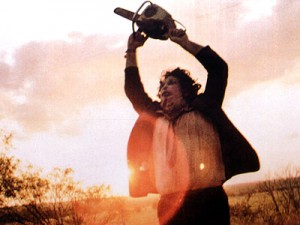 Horror fans want to re-create what drew them to the genre in the first place, whether it is John Carpenter’s Halloween, Wes Craven’s A Nightmare on Elm Street, William Friedkin’s The Exorcist, Tobe Hooper’s The Texas Chainsaw Massacre, Sam Raimi’s Evil Dead series, Stuart Gordon’s Re-Animator, etc. And since most horror films are distilled re-workings of the above films (of course there are other influential films, such as Mario Bava’s Twitch of the Death Nerve/A Bay of Blood and Craven’s The Last House on the Left, but the above titles are some of the most ripped off), we go into these movies hoping that whatever “new,” overhyped film lives up to our minimal expectations, or is at least relatively creative in some aspect of the filmmaking.
Horror fans want to re-create what drew them to the genre in the first place, whether it is John Carpenter’s Halloween, Wes Craven’s A Nightmare on Elm Street, William Friedkin’s The Exorcist, Tobe Hooper’s The Texas Chainsaw Massacre, Sam Raimi’s Evil Dead series, Stuart Gordon’s Re-Animator, etc. And since most horror films are distilled re-workings of the above films (of course there are other influential films, such as Mario Bava’s Twitch of the Death Nerve/A Bay of Blood and Craven’s The Last House on the Left, but the above titles are some of the most ripped off), we go into these movies hoping that whatever “new,” overhyped film lives up to our minimal expectations, or is at least relatively creative in some aspect of the filmmaking.
So now imagine that needy, generous attitude amongst a slew of movies that are destined for obscurity, no matter how positive a reaction they get from the crowd and other festivalgoers. How would those who poured years of time, effort, and money into what may be screening one time on Saturday morning at 9 am, react to having the opportunity to finally be appreciated, if only for just a moment? And if they couldn’t even get those who want to like your work to like it, would they quit the business altogether? Well that fear must fester in the minds of opportunistic producers and directors, and their way of dealing with it is to shill like the conversation that started this piece (which happened verbatim).
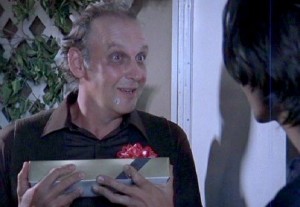 I met Graeme Whifler and his producer at the opening night party for 2005 The New York City Horror Film Festival and they put forth their best effort to promote Neighborhood Watch (retitled Deadly End in the US for its eventual 2008 direct-to-DVD release) using every bit of lingo they could to appeal “to the young people.” I know they gravitated towards me because I had a press badge, amusing since, at least based on the other members of the press I met at the festival, the standards for getting a press badge were really low (obviously, as I had one). No positive review or website blurb that I or anyone else at the festival would help Mr. Whifler and his producer get the kind of attention they needed to make money or get a theatrical release, clearly true since it took three years for Neighborhood Watch to garner a straight-to-DVD release.
I met Graeme Whifler and his producer at the opening night party for 2005 The New York City Horror Film Festival and they put forth their best effort to promote Neighborhood Watch (retitled Deadly End in the US for its eventual 2008 direct-to-DVD release) using every bit of lingo they could to appeal “to the young people.” I know they gravitated towards me because I had a press badge, amusing since, at least based on the other members of the press I met at the festival, the standards for getting a press badge were really low (obviously, as I had one). No positive review or website blurb that I or anyone else at the festival would help Mr. Whifler and his producer get the kind of attention they needed to make money or get a theatrical release, clearly true since it took three years for Neighborhood Watch to garner a straight-to-DVD release.
I wanted to tell Mr. Whifler and his producer that they should mingle with the much younger, nerdier crowd in the dark and overcrowded Lower East Side bar, who would be more likely to be influenced by their schtick, since I would probably see their movie whether or not I ever met them. But I was amused by their pitch and enthusiasm, whether legitimate, or if it was some speech they had memorized in their hotel room the night before. Bragging about how scary the movie was and how “hardcore” the gore was seemed a bit of a stretch for these two guys, especially Whifler*, who, in person, looks like an uptight Republican politician, but I didn’t want to interrupt their momentum.
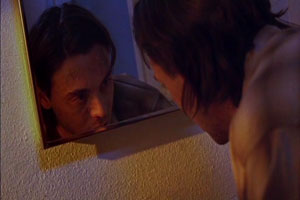 As for their film, Neighborhood Watch, which I was certainly rooting for, well, disjointed would be a nice way of putting it. I was one of the few who sat through the whole movie; maybe 10 out of 70 remained at the end. The tonal changes (there’s a comedic/creepy office subplot that features John Ennis from Mr. Show, that takes up about 30 minutes of screen time and then is abruptly dropped), the fact that the main characters are quite dull, and the randomness of pretty much everything, is nothing compared to the heinous desperation of the gore, an attempt to offend and make the viewer uncomfortable, but it results in boredom and unintentional laughter. Normally, this would be an excuse for the promoters to brag about how intense their movie was and how even the hardcore fan couldn’t handle it (see the egregious internet spamming tactics of Nick Palumbo’s Murder Set-Pieces “street team,” a sleep-inducing bore of a gross-out if there ever was one), but in this particular case, it simply wasn’t true. I talked to a few of the escapees afterward and it was unanimous that Neighborhood Watch was just lousy and tedious, and because it had more of a budget than a lot of the other entries, they were less willing to give it the narrative/competence slack than something made by an amateur.
As for their film, Neighborhood Watch, which I was certainly rooting for, well, disjointed would be a nice way of putting it. I was one of the few who sat through the whole movie; maybe 10 out of 70 remained at the end. The tonal changes (there’s a comedic/creepy office subplot that features John Ennis from Mr. Show, that takes up about 30 minutes of screen time and then is abruptly dropped), the fact that the main characters are quite dull, and the randomness of pretty much everything, is nothing compared to the heinous desperation of the gore, an attempt to offend and make the viewer uncomfortable, but it results in boredom and unintentional laughter. Normally, this would be an excuse for the promoters to brag about how intense their movie was and how even the hardcore fan couldn’t handle it (see the egregious internet spamming tactics of Nick Palumbo’s Murder Set-Pieces “street team,” a sleep-inducing bore of a gross-out if there ever was one), but in this particular case, it simply wasn’t true. I talked to a few of the escapees afterward and it was unanimous that Neighborhood Watch was just lousy and tedious, and because it had more of a budget than a lot of the other entries, they were less willing to give it the narrative/competence slack than something made by an amateur.
One of the major problems with the film was exactly what Whifler and his producer had bragged about, the gore. The movie lingers on the gore (caused by the villain performing unwanted surgery on his neighbors) for so long that it started to actually appear like the deli meat it probably was. I know subtlety is not a staple of the “extreme” horror genre, but when the fakery is exposed by focusing too much on the gross-out material, the tension balloon is deflated, and it begins to look like a very subdued behind-the-scenes DVD feature. This tactic tends to completely overshadow the actors and any effort made to capture your attention, especially with a villain as way over-the-top as in Neighborhood Watch, is lost to all the self-satisfied smuggery of the impersonal gross-out.
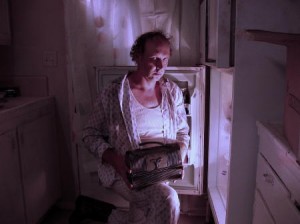 But weren’t most of the films that played at the festival pretty bad? Sure, there was only one entertaining feature (out of nine that I saw over four days) and two or three amusing shorts (out of forty), but Neighborhood Watch was just plain boring and unpleasant. It did win the “best effects” award at the festival, so in a way, Whifler and his producer got what they were after, even if the audience didn’t care.
But weren’t most of the films that played at the festival pretty bad? Sure, there was only one entertaining feature (out of nine that I saw over four days) and two or three amusing shorts (out of forty), but Neighborhood Watch was just plain boring and unpleasant. It did win the “best effects” award at the festival, so in a way, Whifler and his producer got what they were after, even if the audience didn’t care.
I saw them one more time before they left for a festival in Arizona; outside the single theater being used for the NY festival (I told you it was small). Now every critic dreads the moment where filmmakers come up to you and ask you what you thought of the film, and you hated it, but, to be polite, you feel the need to avoid hurting their feelings, and try to find something nice to say.
“So what did you think?”
“It was certainly gory.”
“I told you… You going to give it a good review?”
“Well aren’t you here to sell the movie, not to worry about reviews? If anything, I’d make a suggestion, not that I want to interfere with the creative process. But I think if you cut back on the gore it would not only help the movie, but possibly get you a very marketable R rating?”
“Wow, it freaked you out that much?”
“Well, no. Actually it was the opposite. You had so many close-ups on the intestines and spleens and livers and kidneys, that, to me, it stopped being something possibly horrifying, and became an object. Honestly, it looked like deli meat.”
The producer looked at me with clear disappointment in his eyes.
“It wasn’t deli meat, it was real.”
“You got real cadavers?”
“I didn’t say that.”
“Oh. Well, good luck in Arizona. I know that Lions Gate is here, maybe you could sell them both an R rated and unrated version of the movie, trying out the subtle gore suggestion.”
“Sure. We’ll think about it.”
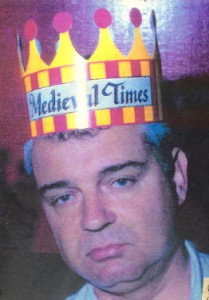 Obviously I didn’t ever see them again and their movie pretty much disappeared for a few years. In fact, the most that came out of the entire festival was that two or three of the films went direct-to-DVD and one or two were also on pay cable at 3 AM. To me, this seems to be just as much of a smack in the face to the filmmakers as the fans, who are basically being told their interests are worthless, and the exclusivity of these screenings actually turn them into idiotic dopes who put up good money to see films not even worthy of any sort of public release.
Obviously I didn’t ever see them again and their movie pretty much disappeared for a few years. In fact, the most that came out of the entire festival was that two or three of the films went direct-to-DVD and one or two were also on pay cable at 3 AM. To me, this seems to be just as much of a smack in the face to the filmmakers as the fans, who are basically being told their interests are worthless, and the exclusivity of these screenings actually turn them into idiotic dopes who put up good money to see films not even worthy of any sort of public release.
If there’s an upside, it’s that… Mr. Whifler takes an awesome picture.
* Whifler also wrote Sonny Boy, a bizarre cult film with David Carradine spending most of his screentime in drag. I haven’t seen the movie because there has never been a home video release in the correct aspect ratio, and since it was it shot at 2.35, the cropping would be too difficult to tolerate. If and when that happens, I’ll watch and review it.
Update: I have now tried to get Sonny Boy released on DVD via a distribution company I was familiar with, if only to finally see the film for myself in its proper aspect ratio. Tracking down the various rights holders was impossible.



